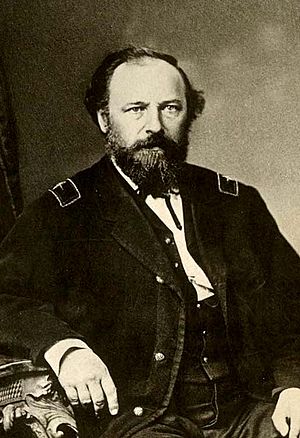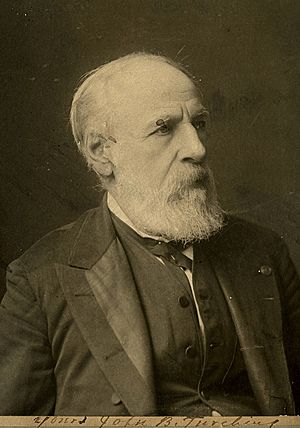Ivan Turchin facts for kids
Quick facts for kids
Ivan Turchin
|
|
|---|---|

Ivan Vasilyevich Turchaninov in 1867, Abraham Lincoln Presidential Library and Museum
|
|
| Birth name | Ivan Vasilyevich Turchaninov |
| Born | January 30, 1822 Don Host Oblast, Russian Empire |
| Died | June 18, 1901 (aged 79) Anna, Illinois |
| Place of burial | |
| Allegiance | |
| Service/ |
Union Army |
| Years of service | 1843–1856 (Imperial Russian Army) 1861–1864 (USA) |
| Rank | Colonel (Imperial Russian Army) |
| Battles/wars | Crimean War American Civil War |
| Signature | |
Ivan Vasilyevich Turchaninov (Russian: Иван Васильевич Турчанинов), born December 24, 1822, and died June 18, 1901, is better known as John Basil Turchin. He was a brigadier general for the Union Army during the American Civil War. He led important attacks at the Battle of Chickamauga. He was also one of the first to lead soldiers up Missionary Ridge.
Turchin faced a military trial for letting his soldiers cause trouble in Athens. He was found guilty. However, President Abraham Lincoln promoted him to brigadier general. This promotion canceled the trial's decision. An officer could only be tried by someone of equal or higher rank.
Contents
Early Life and Career
Ivan Turchin was born in the Russian Empire on December 24, 1822. His family was part of the Don Cossack group. He joined the Russian Army in 1843. In 1852, he finished his studies at the Imperial Military School in St. Petersburg.
His father was a major in the Russian Army. This helped Ivan get into good military schools. He later became a Colonel in the Russian Guards. He fought in Hungary and in the Crimean War. In 1848, he helped the Austrian Empire stop a rebellion in Hungary.
After school, Turchin worked for the Imperial Guards in St. Petersburg. In May 1856, he married Nadezhda Lvov. Later that year, he and his wife moved to the United States. They settled in Chicago. There, he worked for the Illinois Central Railroad.
Joining the Civil War
When the American Civil War began in 1861, Turchin joined the Union Army. He became the colonel of the 19th Illinois Volunteer Infantry Regiment. He led his regiment in Missouri and Kentucky. Soon, his unit was under the command of Major General Don Carlos Buell. Buell was part of the Army of the Ohio.
Buell was impressed by Turchin. He promoted Turchin to lead a brigade in the Army of the Ohio. This brigade was part of the Third Division, led by Brigadier General Ormsby M. Mitchel. In early 1862, Buell's army moved south into Kentucky and Tennessee.
Events in Alabama
Buell moved west to help Grant at the Battle of Shiloh. He left Mitchel to protect Nashville. Turchin wanted Mitchel to move further south. Mitchel did move south and captured Huntsville, Alabama. This was part of a plan to cut off Chattanooga from Confederate help.
Mitchel blocked the Confederates from the west. Another part of the plan involved a spy named James J. Andrews. Andrews was supposed to burn bridges to stop Confederate supplies. But Andrews failed. After the Great Locomotive Chase, Andrews and his team were caught. Some were even executed. Still, Mitchel's forces stayed in northern Alabama.
The Athens Incident
Union soldiers occupied northern Alabama. This led to attacks from Confederate soldiers and local groups. One attack surprised Turchin's soldiers in Athens, Alabama. Union soldiers had been frustrated for weeks. They were tired of constant attacks. Also, General Buell had a policy of protecting Southern property.
Local people were said to have helped the attack in Athens. This made the Union soldiers very angry. When Turchin brought more soldiers, they caused a lot of damage in the town. Some reports say that Southern civilians had fired at Turchin's men.
On May 2, 1862, Turchin's men took back Athens. Turchin reportedly told his men, "I shut my eyes for two hours. I see nothing." He then left to check defensive spots. While he was gone, his men damaged many businesses in the town.
The Military Trial
When General Buell heard about this, he insisted on a military trial for Turchin. This trial became a big national story. It highlighted the debate about how the war should be fought. Many Union soldiers were getting hurt, and some felt the army should be tougher.
Buell had told his soldiers to "protect the dignity of civilians." Turchin knew about this order. Turchin was accused of not doing his duty. He was also accused of not acting like an officer. People said he let his soldiers cause trouble in Athens.
Turchin was found guilty of all charges. The court suggested Buell be kind to Turchin. But Buell ordered Turchin to be removed from the army. However, Turchin's wife and others in Washington helped him. They convinced Secretary of War Edwin Stanton to recommend Turchin's promotion.
President Abraham Lincoln promoted Turchin to brigadier general in July. This promotion made the trial's decision invalid. An officer could only be tried by those of equal or higher rank. Now, Turchin was a higher rank than most of the trial members.
Return to Service
Turchin received a hero's welcome when he returned to Chicago. Many important people wanted Buell removed from command. They also wanted the war to be fought more aggressively. Turchin was given command of a new brigade.
He showed great courage in the battles of Chickamauga and Chattanooga. He also played a role in the Atlanta Campaign.
Turchin's wife, known as Madame Turchin, was always with him. She followed him during his campaigns and saw battles. She wrote a diary about the military campaigns. This is one of the only war diaries written by a woman during that time.
A popular song during the war was "Turchin's got your mule." It was sometimes used by soldiers to make fun of General Braxton Bragg. Turchin left the army in October 1864. He had become ill from the heat during a campaign.
After the War
After the war, Turchin returned to Chicago. He worked as someone who helps people get patents for inventions. He also worked as a civil engineer. Later, he worked in real estate. He helped immigrants settle in southern Illinois.
In 1900, he received a special pension from Congress. He suffered from memory problems, likely due to his heatstroke. He died in a care facility in Anna, Illinois, at age 79. He is buried next to his wife in the Mound City National Cemetery in southern Illinois.
Some people in the South saw Turchin as a bad guy. But his actions were similar to how other Union commanders, like William Tecumseh Sherman, would fight later in the war. They used a very tough way of fighting to try and end the war quickly.
See also
- List of American Civil War generals (Union)
 | James Van Der Zee |
 | Alma Thomas |
 | Ellis Wilson |
 | Margaret Taylor-Burroughs |


